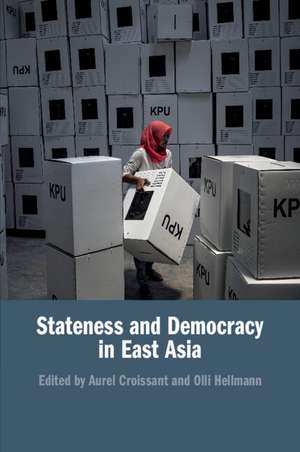Stateness and Democracy in East Asia
Editat de Aurel Croissant, Olli Hellmannen Limba Engleză Paperback – 13 apr 2022
Preț: 238.11 lei
Nou
Puncte Express: 357
Preț estimativ în valută:
45.56€ • 47.57$ • 37.71£
45.56€ • 47.57$ • 37.71£
Carte disponibilă
Livrare economică 14-28 martie
Livrare express 28 februarie-06 martie pentru 26.56 lei
Preluare comenzi: 021 569.72.76
Specificații
ISBN-13: 9781108797382
ISBN-10: 1108797385
Pagini: 291
Ilustrații: 13 b/w illus. 12 tables
Dimensiuni: 152 x 229 x 17 mm
Greutate: 0.43 kg
Ediția:New ed
Editura: Cambridge University Press
Colecția Cambridge University Press
Locul publicării:New York, United States
ISBN-10: 1108797385
Pagini: 291
Ilustrații: 13 b/w illus. 12 tables
Dimensiuni: 152 x 229 x 17 mm
Greutate: 0.43 kg
Ediția:New ed
Editura: Cambridge University Press
Colecția Cambridge University Press
Locul publicării:New York, United States
Cuprins
1. Introduction: Rethinking Stateness and Democracy in Asia Aurel Croissant and Olli Hellmann; 2. State Building and Democratization: The Sequencing Debate and Evidence from East Asia Tuong Vu; 3. South Korea's Democracy and the Legacies of the Developmental State Olli Hellmann; 4. After Hegemony: State Capacity, the Quality of Democracy, and the Legacies of the Party-State in Democratic Taiwan Kharis Templeman; 5. Democratization Interrupted: The Parallel State and the Demise of Democracy in Thailand Paul Chambers; 6. Weak State and the Limits of Democratization in Cambodia, 1993–2017 Kheang Un; 7. The Institutional Roots of Defective Democracy in The Philippines Erik Martinez Kuhonta and Nhu Truong; 8. Stateness and State Capacity in Post-Authoritarian Indonesia: Securing Democracy's Survival, Entrenching its Low Quality Marcus Mietzner; 9. As Good as it Gets? Stateness and Democracy in East Timor Aurel Croissant and Rebecca Abu Sharkh; 10. Stateness and Democracy: Evidence From East Asia and Cross-Regional Comparisons Aurel Croissant and Olli Hellmann; Index.
Recenzii
'Croissant and Hellmann have assembled an impressive volume around a theme of immense scholarly and practical importance - namely, the relationship between state capacity and democracy. Together, the chapters in this volume offer a nuanced view of the way in which state capacity and democracy interact and co-evolve in a variety of country contexts.' Allen Hicken, University of Michigan
'By focusing on the state-democracy nexus, this volume unpacks the various theoretical and conceptual relationships between stateness and democratic consolidation. Drawing on a collection of empirically rich case studies of democratic transitions in Asia, the authors inductively generate new insights into the complicated and varied pathways to and from democracy. Hellmann and Croissant have put together a refreshing take on democracy in a region where political reform is tenuous and a moment in the world when democracy's prospects are fraught.' Joseph Wong, University of Toronto
'This study contributes to the existing research by recognizing the effects of informal institutions and networks on shaping state capacity … This book will be relevant to scholars of state-democracy relations and Asian studies in general … Recommended.' X. Li, Choice Magazine
'By focusing on the state-democracy nexus, this volume unpacks the various theoretical and conceptual relationships between stateness and democratic consolidation. Drawing on a collection of empirically rich case studies of democratic transitions in Asia, the authors inductively generate new insights into the complicated and varied pathways to and from democracy. Hellmann and Croissant have put together a refreshing take on democracy in a region where political reform is tenuous and a moment in the world when democracy's prospects are fraught.' Joseph Wong, University of Toronto
'This study contributes to the existing research by recognizing the effects of informal institutions and networks on shaping state capacity … This book will be relevant to scholars of state-democracy relations and Asian studies in general … Recommended.' X. Li, Choice Magazine
Descriere
Comparative analysis of case studies across East Asia provides new insights into the relationship between state building, stateness, and democracy.
